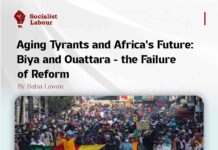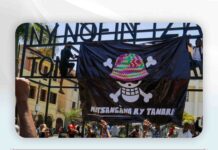BY PAUL MARTIAL
Paul Biya has now been in power in Cameroon for over four decades. A record of longevity leaving the populations drained in a corrupt country in the grip of a dirty war in its English-speaking region. Despite this record, the power of this almost ninety year-old continues to benefit from the leniency of the French authorities.
On November 6, 2022, the dancers in front of the presidential palace were supposed to represent the joy of the people for the anniversary of Paul Biya’s forty years in power. Once the performance was over, the hootings silenced and the laudatory speeches forgotten, life resumed with the many economic and social difficulties that Cameroonians suffer.
An impoverished country
If Cameroon is one of the richest countries in Central Africa, the populations do not benefit from it. GDP growth stood at 4.3% in 1982, when Biya came to power, it was only 0.9% in 2021. The human development index has stagnated for dozens of years. More than 30% of the population is below the poverty line.
At the same time, the stock of debt continues to increase. Two-thirds of these are loans taken out abroad, the remaining third is made up of unpaid salaries of civil servants, unpaid or partially paid pensions and debts to national companies.
Such a distressing economic result can only be understood by the choice of the ruling elite to promote a rentier economy based on the riches of the subsoil, oil and gas and agriculture exports including coffee, cocoa and cotton. No effort has been made to develop an industrial base with on-site processing activity. This economy lends itself perfectly to corruption.
A highly corrupt country
Two cases hit the headlines recently. The first concerns sovereignty lines 65 and 94 of the budget. The first is dedicated to the vagaries of the functioning of the administration, the second to unforeseen investments. One is managed by the Ministry of Finance, the other by the Ministry of the Economy. The results of an audit revealed that senior civil servants, but also business leaders, media bosses, in short the country’s elite, received expenses for missions, sometimes for more than 600 days in a year.
The other case is that of Glengore, an Anglo-Swiss commodity brokerage company which, during a trial in May 2022 in London, confessed to corruption in many countries including Cameroon. Thus leaders of the National Hydrocarbons Company and the National Refining Company benefited from bribes totalling 13 million dollars. Since this revelation, no investigation has been launched. Both companies are sources of funding for President Biya. This allows him to afford luxury vacations for several months at the Intercontinental Hotel in Geneva and to acquire luxury properties such as the “Villa Isis” on the Côte d’Azur.
A country at war
If there are anti-corruption agencies, they serve above all to track down opponents. Many of the latter have been sent to prison, this is the case for the main opposition leader Maurice Kamto. The democratic space is shrinking sharply and the crisis in the English-speaking region in the northwest of the country is not helping matters. Secessionists took up arms demanding independence. Instead of keeping the promise of a federal state, Biya has accentuated the centralization of the country to the point that the English-speaking populations have been marginalized. Since then, the Cameroonian army equipped by France has been waging a merciless war. Both sides are committing the worst abuses against civilians.
If President Macron of France is quick to criticize the shortcomings in terms of human rights by certain governments of African countries which move away from France, he does not do the same for his friends. During his trip to Cameroon, in July 2022, to silence any criticism, he said that “France has no lesson to teach anyone”, a clever way of condoning Biya’s despotic power.






